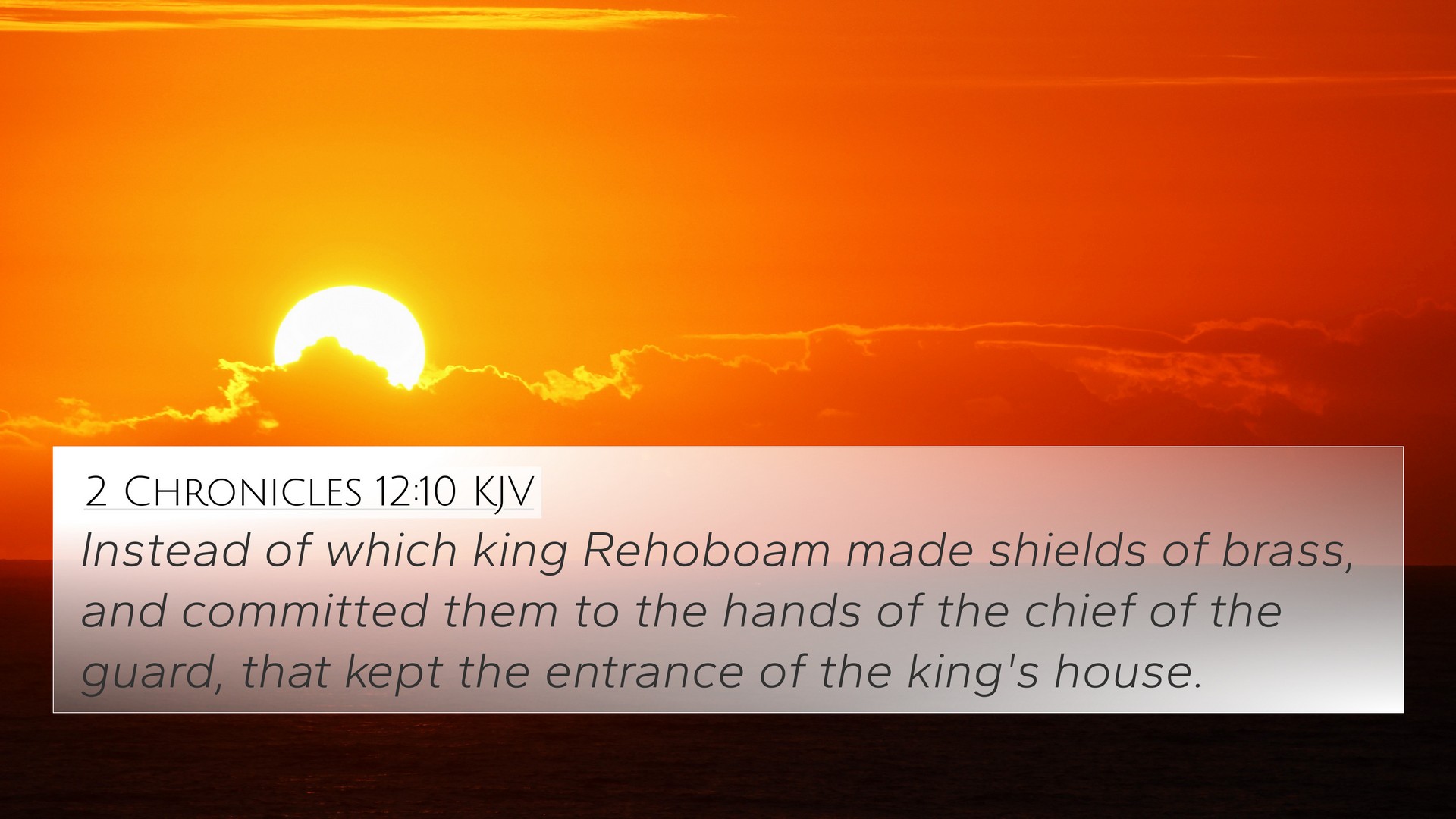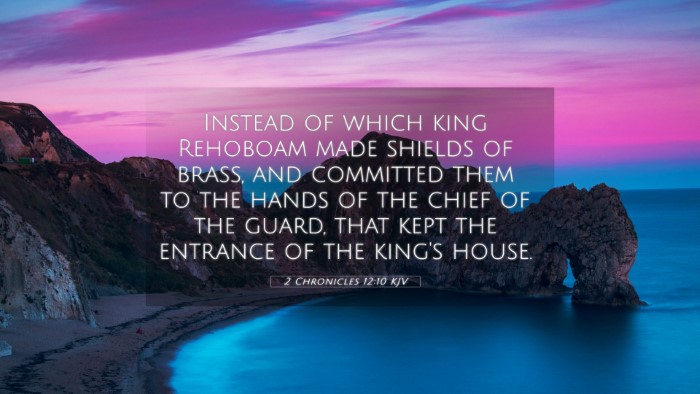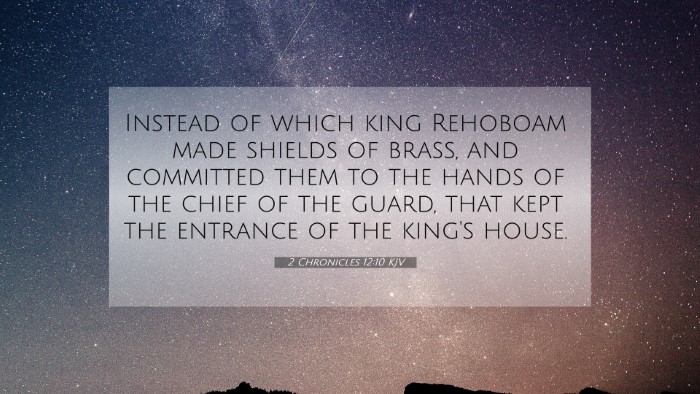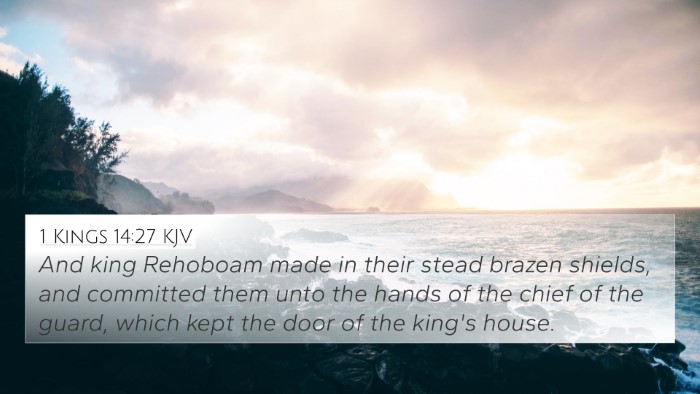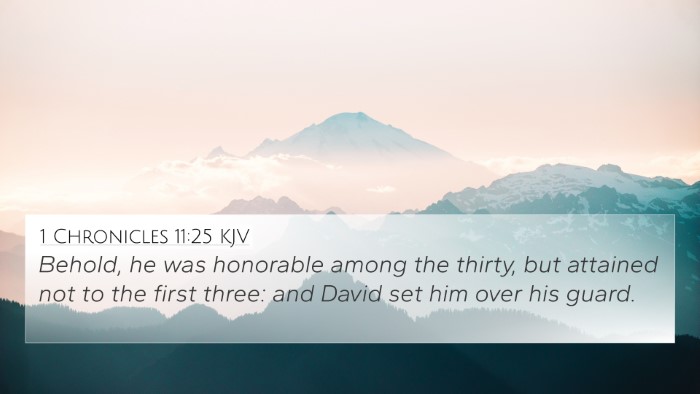Understanding 2 Chronicles 12:10
2 Chronicles 12:10 states: "And as for the king of Israel, he took away the shields of gold which Solomon had made." This verse encapsulates a significant moment in the biblical narrative, highlighting changes in power, wealth, and the consequences of decisions made by leaders.
Verse Context and Meaning
This verse occurs in the context of King Rehoboam's reign and the subsequent military actions relating to Egypt. Following the pattern of biblical kingdoms, this period is marked by shifts in allegiance, power, and spiritual fidelity. Understanding 2 Chronicles 12:10 requires cross-referencing numerous associated scriptures and examining the thematic connections.
Commentary Insights
- Matthew Henry's Commentary: Henry notes that the loss of gold shields signifies a decline in the glory and wealth that characterized Solomon’s reign. The gold shields represented God’s favor, and their removal illustrates Rehoboam's failure to maintain God's blessings through righteousness.
- Albert Barnes' Notes: Barnes emphasizes that taking away the shields shows not only a loss of material wealth but also a deterioration of the king's authority and respect. It portrays a transition where the royal defense is no longer aligned with divine protection but is overtly marked by human folly and defeat.
- Adam Clarke's Commentary: Clarke elaborates on the shields' significance, asserting they were symbols of strength and divine protection. The act of stripping these from the royal armory reflects a deeper spiritual reality: when a king turns away from God, he renders himself vulnerable to external threats.
Bible Verse Cross-References
To fully appreciate the intricacies of 2 Chronicles 12:10, examining its connections to other scripture is essential. Here are several notable cross-references:
- 1 Kings 14:25-26: This passage discusses Shishak’s invasion and how he took treasures from the house of the Lord and the king's house, paralleling the loss noted in Chronicles.
- 2 Chronicles 9:16: Here, we see the glory of Solomon’s reign described, setting a stark contrast to Rehoboam’s loss of gold shields.
- Isaiah 30:3: This verse highlights the folly of seeking help from Egypt instead of relying on God, which can be thematically linked to Rehoboam’s choices.
- Psalm 127:1: “Except the Lord build the house, they labor in vain that build it." This verse echoes the idea that human efforts without divine assistance are ultimately fruitless.
- Matthew 6:19-21: Jesus discusses treasures in heaven versus earth, which resonates with the material losses described in Rehoboam's story.
- Jeremiah 17:5: This verse warns against trusting in man over God, which parallels Rehoboam’s misplaced trust leading to his downfall.
- Matthew 12:25: A kingdom divided against itself cannot stand, reflecting the themes of division and conflict present in Rehoboam's rule.
Thematic Connections
The underlying themes in 2 Chronicles 12:10 can be connected to the broader narrative of Israel's kings and their relationship with God. Key themes include:
- The sovereignty of God: Throughout scripture, God's sovereignty is evident, particularly in how He allows nations to rise and fall based on their obedience or disobedience to Him.
- The consequences of leadership: Rehoboam's actions reflect the broader implications of leadership choices on a nation's fate, drawing a parallel between ancient kingdoms and modern governance.
- Material versus spiritual wealth: This verse serves as a reminder that spiritual integrity leads to true wealth, contrasting with the temporary nature of material possessions.
Prayerful Reflection
When meditating on 2 Chronicles 12:10, it is beneficial to reflect on personal leadership and reliance on divine guidance. Here are some prompts for prayer:
- Ask God for wisdom in decision-making.
- Reflect on areas where material wealth might overshadow spiritual health.
- Pray for leaders to seek divine wisdom to guide their nations.
Using Cross-Reference Tools
To delve deeper into connecting scriptures, employing cross-reference tools can greatly enrich your study:
- Bible concordance: A great tool for finding related verses.
- Bible cross-reference guides: These resources help identify thematic similarities between passages.
- Cross-reference Bible studies: Engaging in these studies can uncover deeper meanings and applications.
Conclusion
In summary, 2 Chronicles 12:10 may seem like a singular event in the rich history of Israel's kings, but it serves as a profound lesson on the importance of faithful leadership, the transient nature of material riches, and the deep spiritual truths that guide us through life's complexities. Engaging with cross-referencing methodologies will provide a more comprehensive understanding of the connections between Bible verses, enriching one’s study and spiritual growth.
